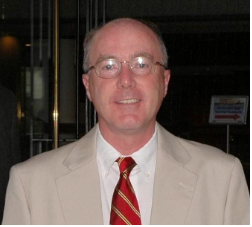Maximum-Likelihood Methods in Target Tracking and Fundamental Results on Trackability
If a generalized likelihood ratio (GLR) test cannot make a good decision, then there is no good decision to be made. If the test is as to whether or not a very low observable (VLO) target is present in heavy clutter, the GLR should be the maximum-likelihood probabilistic data association (MLPDA) tracker. The MLPDA is very effective, but has several operational shortcomings that its close cousin, the maximum-likelihood probabilistic multi-hypothesis tracker (MLPMHT) avoids. We will discuss and compare both algorithms, plus show some fortuitous new MLPMHT developments. Perhaps most interesting, we are now able to set the MLPMHT threshold accurately and confidently, as would be a requirement for real-time operation. And since one cannot do better than ML, we are now able to make fundamental statements about which targets can be tracked and which cannot: These statements are essentially a bound, as opposed to algorithm-specific performance experience.
Date and Time
Location
Hosts
Registration
-
 Add Event to Calendar
Add Event to Calendar
- 215 South Ferry Rd.
- Narragansett, Rhode Island
- United States 02882
- Building: Coastal Institute (bldg. 26)
- Room Number: Hazard Room
- Click here for Map
Speakers
 Dr. Peter Willett
Dr. Peter Willett
Professor, Electrical and Computer Engineering, University of Connecticut
IEEE Aerospace and Electronic Systems Society (AESS) Distinguished Lecturer
Biography:
Peter Willett has been a faculty member in the Electrical and Computer Engineering Department at the University of Connecticut since 1986. Since 1998 he has been a Professor, and since 2003 an IEEE Fellow. His primary areas of research have been statistical signal processing, detection, machine learning, communications, data fusion, and tracking. He was editor-in-chief of IEEE Signal Processing Letters, 2014-2016. He was editor-in-chief for IEEE Transactions on Aerospace and Electronic Systems from 2006-2011, and of the AES Magazine 2018-2021. He is now AESS Vice President for Finance. For 1998-2005 he was associate editor for three active journals – IEEE Transactions on Aerospace and Electronic Systems (for Data Fusion and Target Tracking) and IEEE Transactions on Systems, Man, and Cybernetics, parts A and B. He is a member of the IEEE AESS Board of Governors and of the IEEE Signal Processing Society’s Sensor-Array and Multichannel (SAM) technical committee (and is now Chair). He has published 280 journal papers and 506 conference proceedings papers.
Email:
This meeting will also be offered on Zoom for remote attendees. Zoom link will be emailed to registrants the day of the event.

